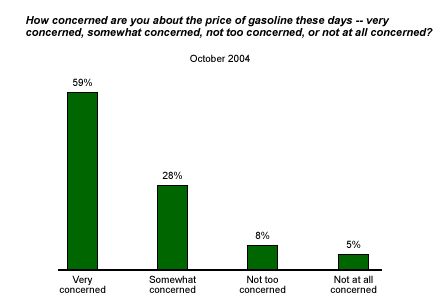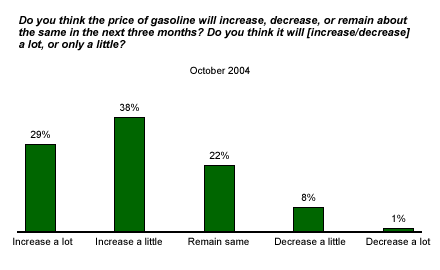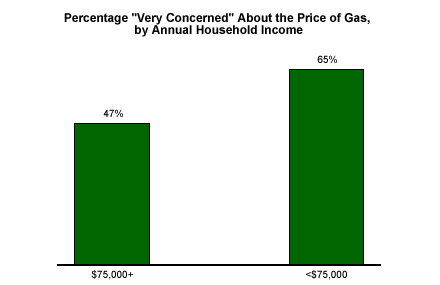In his address to the National Italian American Foundation on Oct. 15, Federal Reserve Chairman Alan Greenspan spoke about rising oil prices in reassuring terms. He reiterated his faith in the power of the markets to restore a more reasonable equilibrium price, and noted that despite the recent surge, the average crude oil price "in real terms is still only three-fifths of the price peak of February 1981." Greenspan also said that the effect of the current surge is likely to be "less consequential to economic growth and inflation than in the 1970s."
These are familiar arguments. Even as oil prices ran up by more than 40% over the last year, economists have ceaselessly reminded us that in inflation-adjusted terms, the recent oil price increase is far off the highs reached during the last few decades. Economists also point out that the U.S. economy is much less dependent on oil than it was in 1970. Nevertheless, Americans are concerned about the price of fuel.
In a poll conducted earlier this month*, Gallup measured public opinion on the subject of rising gas prices. Nearly 6 in 10 Americans (59%) say that they are "very concerned" about the price of gas these days. Another 28% of Americans are "somewhat concerned." All told, 87% of Americans are worried about this problem.

High gas prices are causing national anxiety and Americans don't see the problem going away anytime soon. Eighty-nine percent of Americans expect that gas prices will either increase or stay the same over the next three months, including 29% who expect them to increase a lot and 38% who expect them to increase a little.

The problem isn't equally troubling to all Americans -- there are disparities in how it is perceived by more affluent households and their counterparts in middle- and lower-income households. While 65% of Americans with annual household incomes of less than $75,000 are very concerned about high gas prices, only 47% of those earning $75,000 or more say the same.
This income difference cannot be explained by differing expectations for future gas price increases. Similar percentages of those from the more affluent segment and middle- and lower-income segments believe that gas prices will increase or stay the same over the next three months.

Bottom Line
Greenspan's address was cautiously optimistic, but Federal Reserve Gov. Ben Bernanke was more cautious and less optimistic in remarks at Darton College. Bernanke said the run up in oil prices could be a "significant shock" to economic growth.
Innovation, market forces, and some measure of geopolitical stability can be expected to bring oil prices lower in time. But for now, Americans, like Bernanke, remain wary.
*Results are based on telephone interviews with 1,012 national adults, aged 18 and older, conducted Oct. 11-14, 2004. For results based on the total sample of national adults, one can say with 95% confidence that the margin of sampling error is ±3 percentage points.
